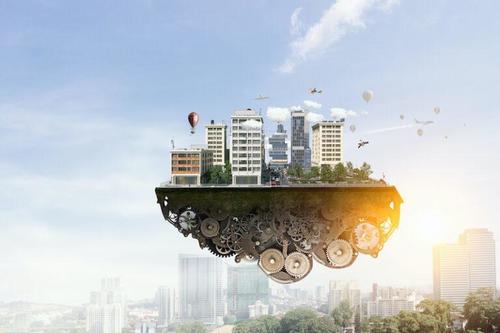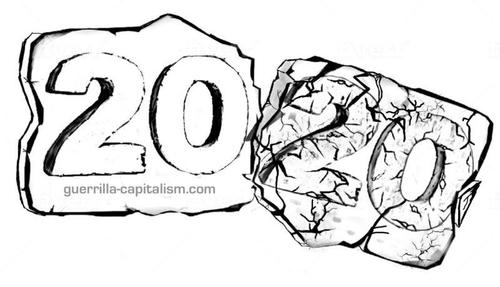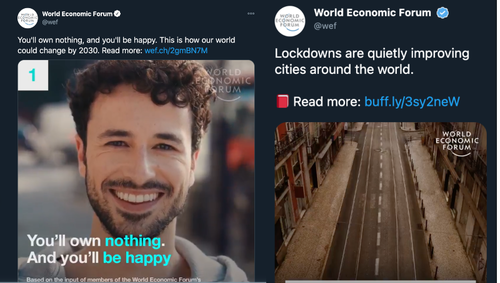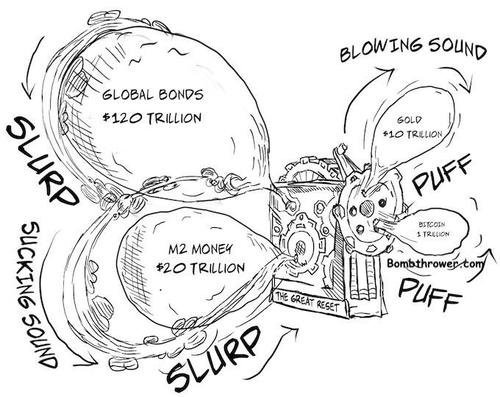Atlas Is Shrugging: Forget 'The Great Reset', Here Comes 'The Great Reject'
Never mind The Great Reset. Here comes The Great Reject.
It occurred to me that I never did finish the final instalment of last summer’s Jackpot Chronicles, wherein I posited four possible post-Covid scenarios.
For a quick refresher, The Jackpot is concept I cribbed from William Gibson. It’s a term he uses across a few of his near-future cyberpunk novels that describes a series of rolling global catastrophes that set in sometime around 2016 (his stories span multiverses, and timelines, but the common theme is that somewhere around 2016, some kind of irrevocable glitch in the matrix occurred that put a permanent end to normalcy as it has been understood up until that point).
If there was a Jackpot, whatever it was, it could arguably have happened at many points throughout the 20th century, or if we wanted to confine our speculation to the 21st century then, 9/11 or the GFC would do. Everything after that being symptomatic as opposed to causal.
And then… 2020 and COVID hit. That’s when the fabric of time cleaves us into the before times and The Jackpot.
The other post-pandemic scenarios from the rest of my Jackpot series were:
Force Majeure: The wheels come off completely and the system comes unglued. Mad Max.
Tin Foil Hat: It really is one Big Conspiracy and we’re into a New World Order.
The Great Bifurcation: The middle class gets wiped out and we get a two-tier society
I had thought the fourth scenario would be the one themed Deglobalization, and to a certain extent it still is. In the original outline I described that Deglobalization:
“Is where multi-national corporations, so shaken from this Near Death Experience, realizing their error of betting the farm on just-in-time supply chains, labour cost arbitrage and having zero buffers, begin pulling manufacturing back home.
The smart ones start building cushions and shock absorbers into their business logic, and they begin to eschew leverage after being on the wrong side of a series of cascading liquidity implosions. In other words, businesses begin to transition themselves into what I called “Transition Companies” as posited in the inaugural posting for [this blog]”.
I also went on to say that I considered this one most desirable yet least likely. My view on this scenario has changed somewhat, and I also think that the staggering government ineptitude and duplicity at all levels in all jurisdictions (with few notable exceptions) has made our regeared “4th scenario” more likely given that it’s in progress. Mass demonstrations, mass exoduses, crypto-currencies are symptoms of a Great Reject, or as I’ve renamed this scenario “Atlas Shrugged“.
The TL,DR of the novel, Atlas Shrugged is that once the institutional sclerosis of the ruling class was understood to be both incorrigible and irreversible, the only other option was a global opt-out. There was no Great Reset in Atlas Shrugged. They got The Great Reject instead.
Under the Atlas Shrugged scenario, deglobalization is just one of numerous motivating factors, but it’s mainly an outcome of a larger dynamic where all non-ruling factions in society lose faith in the prevailing structure of Neoliberal Globalism (a.k.a “Mr. Global”). With Mr. Global’s viability in question, people begin to look for the exits.
This begins to occur on two fronts. What Vilfredo Pareto called “the non-governing elites” begin to realize that the system which used to accommodate them, even rely on their tacit support, is now becoming hostile toward them. At the very least, the ruling elites are undermining their interests. This is part of the dynamic of Peter Turchin’s “elite overpopulation” that we looked at recently.
The other front is the comparatively powerless underclass, which, in pace with Pareto’s Theory of Elite Cycles, lose their moorings and standing within the system they are expected to adhere to. The social contract no longer seems to be a matter of middle-class protections and living standards but instead becomes starkly authoritarian and one-sided. What is clear is that the existing institutions are now functioning to defend the position of the overclass, not to uphold the rights and liberties of the underclass.
The culmination of multiple super-cycles (Pareto’s Elite Cycles, Turchin’s long term dynamics of sociopolitical instability, debt, a Fourth Turning, and a Maunder Minimum for good measure) combined with an accelerated onslaught of technological innovation: Internet, crypto-currencies …biotech? Nanotech? Micro nuke? Fusion? Quantum computing? We have all the necessary components for a complete breakdown of existing institutions and the total loss of legitimacy of the current governing elite class.
So it goes in our Atlas Shrugged scenario. Various interests of many forms and myriad factions, from dissident states (like Florida), to decentralized and virtual companies, emergent DAO’s, all the way to individuals and cultural tribes all begin to experience these moments of clarity in their own way. From there they will act in their own rational self-interests and cooperate with others doing the same in order to navigate the breakdown of Mr. Global.
In spite of this, Mr. Global’s prevailing policymakers and governance structures will frantically maneuver and spin narratives of fear and fantasy in order to keep the existing system on the rails.
They walked back the second one, but not the first one.
That is what The Great Reset really is: it’s an attempt at a zeitgeist-level rationalization that doubles-down on institutional failure on the part of the entire governance structure of Mr. Global, and gives them a new lease on life to remain in charge. Reimagined by the Davos crew, amplified by the mainstream media, lubricated by Big Tech.
The antidote to all of this are crypto-currencies, smart contracts and decentralization.
That antidote also brings significant upside regardless of which one of our four possible scenarios plays out.
When I listen to people who are complete denial about crypto, I realize that there is a common thread in their objections (what made me think about all this today was listening to Michael Pento’s criticisms of Bitcoin on George Gammon’s Rebel Capitalist. Pento’s 2012 book on the inevitable bursting of the bond bubble is a must read. That book helped be form the basis on what I think is the funds flow that is actually putting a floor under crypto. I don’t begrudge Pento for not seeing it, because as I’ll explain, he’s looking at it through the wrong lens)
We could go on for hours about how most of these people haven’t really delved into the technology or what it means, how their criticisms at the defects around Bitcoin apply even more accurately to US dollars (“backed by nothing”, “infinite supply”, “uses too much energy”, et al). But what they all have in common is that they all posit that whether Bitcoin and cryptos succeed or fail is premised on whether the existing establishment will permit it.
What will the Fed do? What if the government bans it? Won’t the World Bank just create their own CBDC?
This is completely inverted. They have it backwards. It’s not up to the existing system, because the existing system is over. That’s the part they don’t get.
The existing system should be looking for its place in the new reality of network states, not pontificating how it will run the new landscape. The coming system will be multipolar in not just the geopolitical dimension, but across cyberspace and the network dimensions as well.
Instead, the incumbent system is busy banning menthol cigarettes, imposing negative interest rates and undergoing mass conversion to a peculiar new religion called Wokeness.
It won’t work, and it brings to mind a particularly vivid example I once heard about a balloon disaster that still makes me cringe when I think of it:
A group of people were embarking on a balloon ride and as they were just a foot or two off the ground, the burner erupted into flames. The balloon pilot realized immediately what this meant and he leapt from the gondola which was still only a few feet off the ground.
One or two of the passengers were quick witted enough to realize what this meant and followed him. This set off a feedback loop: as the fire expanded, its hot air forcing the balloon higher, combined with the weight reductions as the first few people bailed out, the situation very quickly escalated past a point of no return.
The balloon had accelerated very rapidly to heights from which it was no longer possible to leap safely. The unfortunates who had hesitated and were trapped in a gondola being propelled higher by a fireball, to their inevitable doom.
That’s what our entire situation feels like today. The balloon is still hanging a foot or so above the ground, the canopy is on fire, and the people who have figured out what this means are bailing out while they can and in doing so they are accelerating the ultimate burn-then-crash of the entire system.
In Rand’s book they went to a hidden valley called “Galt’s Gulch” and used their skills and their resources to restore new communities while the old systems imploded. If this scenario plays out we’d be looking for people creating a decentralized, network of gulches. Seeking each other out who are pursuing this same goals, creating open protocols to to rebuild civil societies and autonomous communities built on the ageless principles of free markets, liberty and prosperity.










Geen opmerkingen:
Een reactie posten